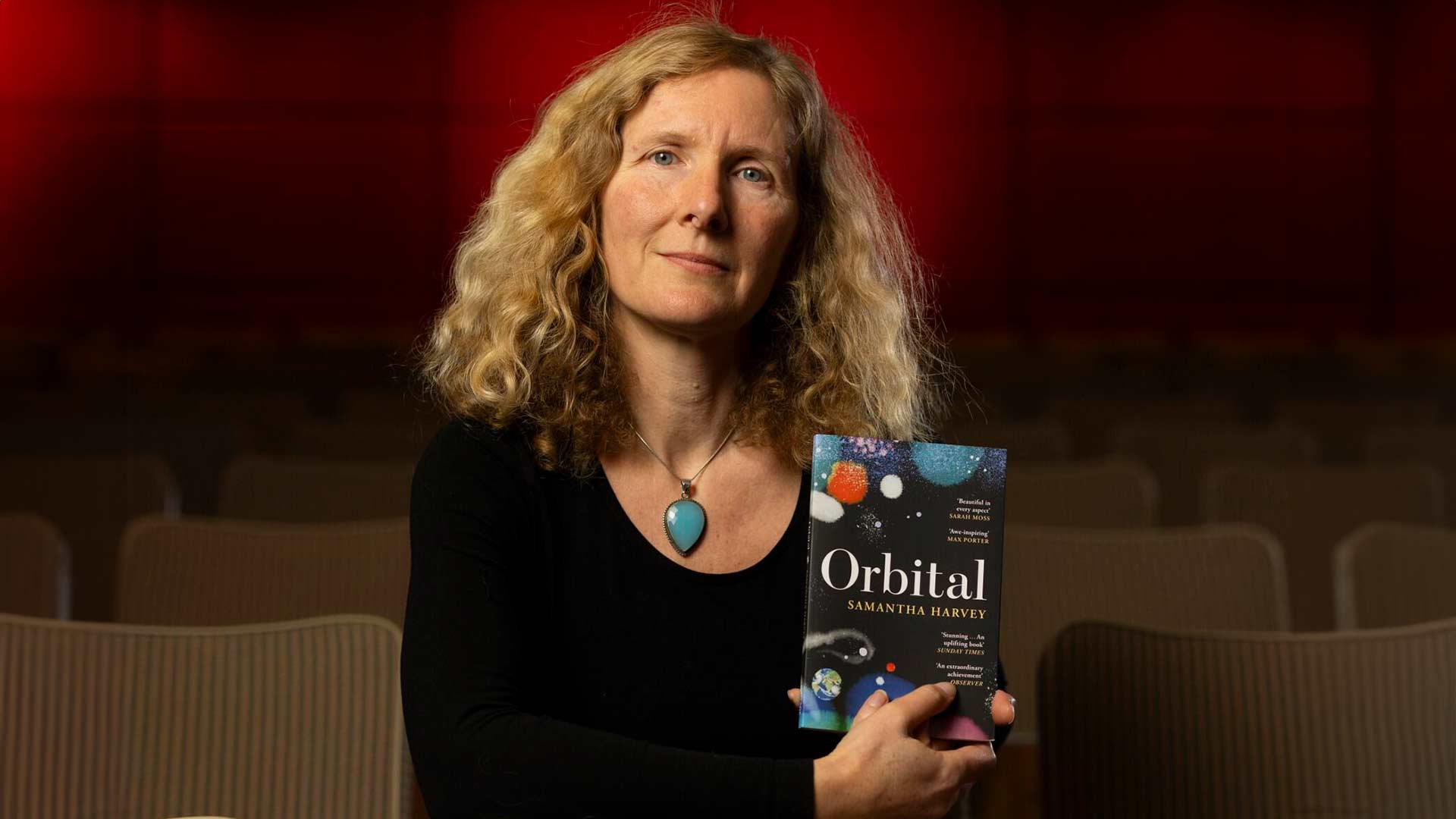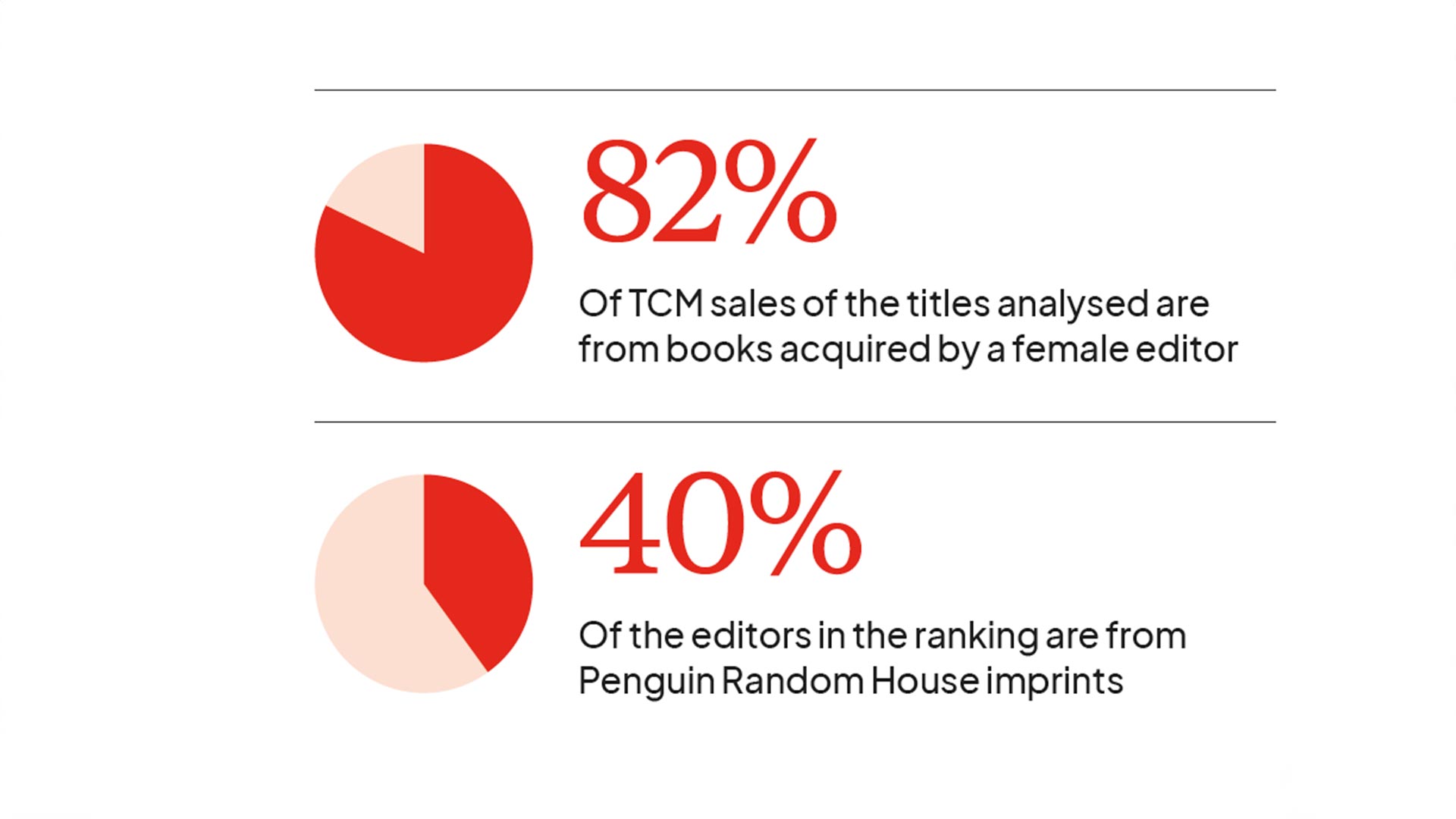You are viewing your 1 free article this month. Login to read more articles.
Wonder Wall leads The Bookseller’s inaugural ranking of acquiring editors
Using a formula based on Nielsen BookScan TCM sales and literary prize success, The Bookseller’s first editor ranking highlights those making waves in the sector.

With an enviable year of critical and commercial success for her authors, Viking’s publisher for literary fiction Isabel Wall has topped The Bookseller’s first-ever ranking of British and Irish acquiring editors.
Wall scored a 24 on the list, based on a formula that factors in sales of books published in 2024 through Nielsen BookScan’s Total Consumer Market’s Top 5,000, alongside literary prize wins, shortlistings and longlistings (more on the methodology left and below). Wall edged out Fourth Estate publishing director Kishani Widyaratna, while Century publisher Selina Walker, Fern Press publishing director Michal Shavit and Chatto associate publishing director Clara Farmer round out the top five.
It has been an acquiring editor’s dream of a 12 months for Wall, undoubtedly topped by VV Ganeshananthan’s Brotherless Night, picked up at auction from Stephanie Cabot at Susanna Lea in 2022, bagging the Women’s Prize for Fiction. But that wasn’t all at the awards podium: Caleb Azumah Nelson’s Small Worlds scooped the Dylan Thomas Prize, Hisham Matar’s My Friends captured the Orwell political fiction gong, while Yael van der Wouden’s The Safekeep was Booker shortlisted.
Wall also steered heavyweights including Elif Shafak and Elizabeth Strout to market, while publishing one of the most talked-about (if somewhat controversial) literary events of 2024, Gabriel García Márquez’s “lost” novel, Until August. All told, Wall’s authors shifted a hefty 215,000 units through the TCM, led by 65,000 copies of the paperback of Alice Winn’s In Memoriam, which also won the Nibbie for Debut of the Year. That’s not all: Wall was also named among this year’s The Bookseller Rising Stars tranche (14 of this top 30 have appeared on previous Rising Stars lists).
There are a number of relative tyros, and it is no surprise that many of them work in the BookTok end of the market
Wall heads a ranking in which women dominate: the top five acquiring editors are female, along with nine of the top 10 and 27 of the top 30. This is a scenario that plays out not just in this top 30. A shade over 36.1 million units were sold through the TCM used in our ranking against titles in which an editor could be identified, and a huge 82.3% of that volume (29.7 million copies) was acquired by a woman. That is not just because women make up the majority of staff across publishing’s editorial departments, though there is certainly a huge gender split: we identified 682 individual editors across the TCM titles, 79% of whom were women. But on a pure sales basis, female editors far outpaced their male counterparts, with authors for the average woman editor in our data generating 55,238 unit sales through BookScan; the median for the average male editor was 11,000 fewer copies.
With a dozen editors across the top 30, and four of the first five, Penguin Random House shows a clean pair of heels to the rest of the publishing pack. Perhaps no surprise as PRH has had an incredibly strong 2024 at the upper echelons of the charts: of the 50 bestselling titles released since 1st January, PRH has published 24 of them. It has done extremely well at “posh bingo”, sweeping the big three UK-based awards (the Booker, Women’s Prize for Fiction and Baillie Gifford Prize).
As the sales portion of the formula is based on a top 5,000 chart, it inevitably favours bigger players. Every house having multiple entries is a conglomerate, with HarperCollins second on four spots, Hachette notching three places, while Pan Macmillan and Bloomsbury sport two apiece. Four of the 30 hail from indies: David Fickling Books’ managing and publishing director Liz Cross (responsible for much of Nibbie Illustrator of the Year Jamie Smart’s 2024 output); Faber publisher Alex Bowler (Sally Rooney and Rachel Cusk’s editor); Souvenir Press editorial director Cindy Chan (who brought Murdle to the Profile imprint); and Granta associate publishing director Laura Barber, who guided Jenny Erpenbeck and translator Michael Hofmann’s Kairos to International Booker glory.
Before sinking our teeth into the finer detail of the list, we should step back and acknowledge that editors are, of course, just a part of a team, and the success of a book is also down to the marketers, publicists, sales reps, designers, production managers and senior staff who sign off the advances (to name a few roles). But we have focused on editors as the first port of call in an author’s journey to publication.
We narrowed the parameters down to the 5,000 top-selling titles published in 2024 – in first or subsequent formats – based on TCM data. A 2024 publication window does, admittedly, miss some of the biggest titles of the past 12 months, including the year-to-date’s third (Freida McFadden’s The Housemaid), fourth (Colleen Hoover’s It Ends with Us) and fifth (Sarah J Maas’ A Court of Thorns and Roses) bestselling books. Plus this ignores all backlist, a crucial revenue stream – perhaps the primary revenue stream – in some categories; managing Julia Donaldson’s catalogue is arguably the most important job at Macmillan Children’s Books and Scholastic’s Alison Green imprint.
We determined the editor for all 5,000 of these titles by either accessing The Bookseller’s own rights database or canvassing agents and publishers to identify the dealmakers. We should re-emphasise that this focuses on the acquiring editor, who is not necessarily the person who brings a book to market. Indeed, some editors on the list’s greatest hits (in terms of the ranking) are from previous roles. A prime example is fourth-placed Shavit. She has been going great guns since setting up her Vintage imprint, Fern Press, in 2023. But her haul is largely due to her buy of Samantha Harvey’s 2024 Booker Prize-winning Orbital when she was publishing director at Jonathan Cape. (The now-retired Dan Franklin had brought Harvey to the list.)
To be eligible, the editors must work at a UK or Ireland-based house. This means we did not factor in titles such as McFadden’s work published under Illinois-based Sourcebooks (distributed in the UK by DK) or Sarah J Maas’ House of Flame and Shadow, bought for Bloomsbury by New York-based executive editor Noa Wheeler.
We also excluded in-house IP projects/series and licensed character releases, as the model is somewhat different than much of the rest of trade publishing: deals are often conducted by a team of people and can be global partnerships that do not originate in Britain. Of course, this part of the market can be wildly lucrative. Take Ladybird’s Bluey and Peppa Pig businesses, just two properties of PRH Children’s extensive IP portfolio overseen by a department led by licensing publishing director Leanne Gill. There have been 44 new titles released in the past 12 months across both characters, with TCM sales standing at 715,000 copies.
The point system has two planks. The first is the most straightforward, with an editor’s cumulative authors’ TCM volume on a sliding scale between one to 15, with 15 awarded if sales were over one million units, 14 for 900,001 units to one million, and so on, down to one point for sales between one and 5,000 copies.
No editor earned a 15, but yet another Viking publishing director, Harriet Bourton, was the top scorer on nearly 720,000 units, 651,000 copies of which were from Richard Osman’s paperback of The Last Devil to Die and his September hardback, We Solve Murders. Two others were in the 600,000-plus club: Penguin Michael Joseph publishing director Maxine Hitchcock, led by the 211,000 units generated by one of the hits of the summer, Claire Douglas’ The Wrong Sister; and Cornerstone MD Venetia Butterfield, a good portion of her authors’ sales coming from the orchestration of the James Patterson deals. (Patterson and his co-authors had 11 hardbacks and 16 mass-market paperbacks released by the PRH division this year, moving 508,000 units.)

Prizes are also awarded on a one to 15 scale, with 15 for the Booker, a 14 for either the Women’s Prize for Fiction or Baillie Gifford, down to one point for a number of various gongs’ short- and longlistings. We acknowledge that this is far from an exact science, though we have tried to assemble the prize rankings by retailer buy-in, rather than perceived eminence. A Booker shortlisting, for the purposes of our listing, is worth twice as much as winning the TS Eliot Prize. We covered over 30 UK and Ireland-based prizes awarded in 2024, all of which had to be for specific books, not full-career nods. Hamish Hamilton publisher Simon Prosser, therefore, has not benefited from Han Kang winning this year’s Nobel Prize in Literature.
When a title has been bought by more than one editor, the acquirers are both awarded the full whack of points. An example of this is HarperVoyager publisher Natasha Bardon and her HarperCollins colleague, The Borough Press deputy publishing director Ann Bissell. The duo jointly snapped up Rebecca F Kuang’s Yellowface, and thus both benefit in our ranking from the mass-market paperback’s nearly 255,000 copies in TCM sales and its Fiction Book of the Year triumph at the Nibbies.
An editor’s maximum prize score is the highest point they hit on the pyramid. A perfect pure score, then, would be 30: 15 for more than one million units in TCM sales plus another 15 for a Booker triumph. But one bonus point is given for each subsequent award win.
For those on the same score, the higher ranking goes to the editor with greater TCM sales, sort of like goal difference determining positions on a football league table. There are three others on 11 points that miss out on the top 30 via sales differential: Faber associate publisher Laura Hassan, Puffin fiction publisher Ben Hornslen and Simon & Schuster deputy publishing director for crime and thriller Katherine Armstrong.
The assumption when we first started this exercise was that it would comprise veteran editors, divisional heads or even the MDs who are occasionally wheeled out for dealmaking because the egos of mega-brand authors or celeb memoirists demand the big cheese signs them up. Those folk are present but there are far more relatively early career entries than we originally thought. Even Wall and Widyaratna might fall into this latter category as they are both around a decade into publishing. But there are a number of relative tyros too, and it is no surprise that many of them work in the BookTok end of the market, such as Piatkus editor Rebekah West or Puffin’s editorial director Amina Parchment-Youssef.
West first signed Rebecca Yarros to Piatkus when she was an assistant editor just two years into the industry. Certainly a vote of confidence for a young editor, but it has paid off: the romantasy author’s Fourth Wing is the entire Hachette group’s bestselling title published in 2024 by a massive 150,000 units and Yarros won the Pageturner Award at this year’s Nibbies. And perhaps that is the link across all 30 in this list: not necessarily experience but an unerring eye for talent and what can work in the marketplace.
Editor 30 Criteria
The Editor Score is based on a ranking of an acquired author’s combined sales through Nielsen BookScan’s Total Consumer Market Top 5,000, plus literary prize performance, with two gradated tables of one to 15 points. TCM sales are for the first 46 weeks in 2024 and are for titles published in 2024 (in any print format) only. Prizes must have been awarded since 1st January 2024. Acquiring editors must be based in the UK or Ireland.
For sales, 15 points are awarded for TCM sales of more than one million units; 14 points for 900,001 to one million units; and so on, down to one point for sales of between one copy and 5,000 units.
For prizes, an editor receives 15 points for a Booker Prize win; 14 for a Women’s Prize for Fiction or Baillie Gifford triumph; and down to one point for various prizes’ short- and longlistings. Prizes must be awarded by a UK or Ireland-based organisation. An editor’s prize score corresponds to the highest level one of their authors attains. Therefore, a maximum “pure” score is 30, for sales over one million units and a Booker Prize win. However, an editor is given one bonus point for each additional prize win.
1. Isabel Wall
Viking
Publisher, literary fiction
Penguin Random House
Editor score: 24
2. Kishani Widyaratna
Publishing director
Fourth Estate
Editor score: 22
Widyaratna is the reigning British Book Awards Editor of the Year for a 2023 that saw her publishing the likes of Yomi Adegoke’s ( 1) The List and Monica Heisey’s Really Good, Actually. Widyaratna may make Nibbies history and win the gong two years on the trot, as her 2024 has arguably been even stronger, led by Asako Yuzuki’s all-conquering Butter, translated by Polly Barton. The title, aided by Emma Pidsley’s eye-catching design, is HarperCollins’ bestselling book originally published this year and has been buoyed by unstinting support from indie booksellers and Waterstones, with the chain naming it its Book of the Year.
3. Selina Walker
Publisher
Century
Penguin Random House
Editor score: 21
4. Michal Shavit
Publishing director
Fern Press
Penguin Random House
Editor score: 21
5. Clara Farmer
Associate publishing director
Chatto
Penguin Random House
Editor score: 21
6. Natasha Bardon
Publisher
HarperVoyager
HarperCollins
Editor score: 19
7. Federico Andornino
Executive publisher
Sceptre
Hachette
Editor score: 18
8. Alexis Kirschbaum
Head
Bloomsbury Trade
Bloomsbury
Editor score: 17
9. Maria Rejt
Publisher
Mantle
Editor score: 17
It was a 2024 of bestsellers and prize recognition for Rejt and Mantle, the boutique Pan Mac imprint she has run since 2010. Kate Morton’s Homecoming and Kate Mosse’s The Ghost Ship led at the tills, combining to shift 200,000 units. Percival Everett was the critical star as his retelling of Huckleberry Finn, James, was shortlisted for the Booker. A year tinged with sadness, though: the great CJ Sansom passed away just as his backlist was reissued to coincide with the launch of the Shardlake series on Disney+.
10. Rebekah West
Editor
Piatkus Fiction
Hachette
Editor score: 17
11. Liz Cross
Managing and publishing director
David Fickling Books
David Fickling Books
Editor score: 16
12. Ann Bissell
Deputy publishing director
The Borough Press
HarperCollins
Editor score: 16
13. Simon Prosser
Hamish Hamilton
Publisher
Penguin Random House
Editor score: 16
14. Helen Garnons-Williams
Publishing director
Fig Tree
Penguin Random House
Editor score: 16
15. Emma Jones
Editorial director, fiction and YA
Macmillan Children’s
Pan Macmillan
Editor score: 16
16. Bea Hemming
Deputy publishing director
Jonathan Cape
Penguin Random House
Editor score: 15
17. Lucy Pearse
Fiction publisher
Simon & Schuster Children’s
Simon & Schuster
Editor score: 15
18: Cindy Chan
Editorial director
Souvenir Press
Profile
Editor score: 14
19. Romilly Morgan
Publisher
Brazen
Hachette
Editor score: 14
Morgan has led her “books with bite” Octopus imprint Brazen since 2021, a list that has been firing on all cylinders of late. Florence Given’s Women Living Deliciously has been a hit and there has been an astute move into fiction, including Mai Mochizuki and translator Jesse Kirkwood’s The Full Moon Coffee Shop. But the star has been comedian Fern Brady’s memoir, Strong Female Character, with over 36,000 copies sold in paperback along with a trio of award wins (Nibbies, Nero and Books Are My Bag).
20. Ellen Holgate
Publisher
Bloomsbury Children’s
Bloomsbury
Editor score: 14
21. Hannah Westland
Publishing director
Jonathan Cape
Penguin Random House
Editor score: 14
22. Alex Bowler
Publisher
Faber
Faber
Editor score: 13
23. Emma Matthewson
Publishing director
Hot Key and Piccadilly
Bonnier Books UK
Editor score: 13
24. Harriet Bourton
Publishing director
Viking Fiction
Penguin Random House
Editor score: 12
25. Amina Parchment-Youssef
Editorial director
PRH Children’s PRH
Editor score: 12
Parchment-Youssef is not yet a year into her role at PRH after moving over from Simon & Schuster Children’s so the bulk of her score stems from her previous job. But you can see why the Penguin Random House division poached her: Parchment-Youssef acquired two of the top three bestselling 2024-published titles for S&S kids’ this year, led by Lauren Roberts’ Reckless, bought in concert with her US colleague Nicole Ellul. There have also been hits and prize listings for the likes of Tolá Okogwu and Katie and Kevin Tsang.
26. Laura Barber
Associate publishing director
Granta
Granta
Editor score: 12
27. Maria Tunney
Editorial director
Walker
Walker
Editor score: 12
28. Maxine Hitchcock
Publishing director, fiction
Penguin Michael Joseph
Penguin Random House
Editor score: 11
29. Venetia Butterfield
Managing director
Cornerstone
Penguin Random House
Editor score: 11
30. Lindsey Heaven
Fiction publishing director
Electric Monkey
HarperCollins
Editor score: 11











